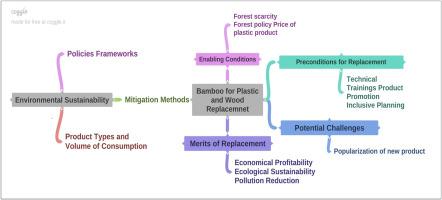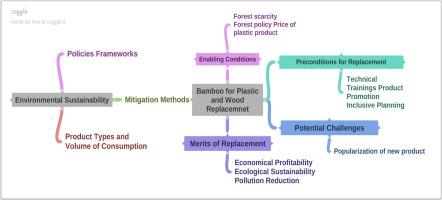探索向竹替代品的转变:埃塞俄比亚木材和塑料替代品的案例研究
IF 10
1区 环境科学与生态学
Q1 ENGINEERING, ENVIRONMENTAL
引用次数: 0
摘要
本研究探讨了竹子作为埃塞俄比亚园艺部门塑料和木材的可持续替代品的潜力。这项针对小微企业、农民和超市的研究显示,人们对纸箱的需求很大。由于环境法规、原材料短缺和公众不满,目前盒子的可持续性受到质疑。尽管有公认的优势,但在埃塞俄比亚,竹子在盒子生产中的使用尚未开发。然而,考虑到竹盒子的标准特征,利益相关者对其持开放态度。该研究预测,竹盒需求将以每年15%的速度增长,并根据用户偏好提出了超市、单标准和双标准竹盒。提出了加强竹箱运营的战略路线图。与塑料和木材替代品相比,竹制品具有显著的环境和经济优势,有助于减少污染和加强废物管理。然而,向竹子的过渡可能会面临阻力。因此,宣传活动和试点项目可以突出它的好处。在培训和供应链设置方面的重大投资,以及与当地供应商的合作伙伴关系和强大的物流网络至关重要。支持性政府政策和激励措施至关重要,特别是那些促进可持续做法的政策和激励措施。与非政府组织合作可以提高认识。需求的增加需要可持续管理、社区农业和认证实践。该研究建议将该产品作为试点项目推广,进行在职测试,为企业提供资金支持,并保持定期监测。本文章由计算机程序翻译,如有差异,请以英文原文为准。


Exploring the shift to bamboo alternatives: A Case Study on wood and plastic replacement in Ethiopia
This study explores the potential of bamboo as a sustainable alternative to plastic and wood in Ethiopia's horticulture sector. The research, targeting Small and Micro Enterprises, farmers, and supermarkets reveals a significant demand for boxes. Current box sustainability is questioned due to environmental regulations, raw material scarcity, and public dissatisfaction. Despite acknowledged advantages, bamboo's use in box production is unexplored in Ethiopia. However, stakeholders are open to bamboo boxes, given their standard features. The study forecasts a 15% annual increase in box demand and proposes supermarket, single standard, and double standard bamboo boxes based on user preferences. A strategic roadmap is suggested to enhance bamboo box operations. Bamboo products offer significant environmental and economic advantages over plastic and wooden alternatives, contributing to reduced pollution and enhanced waste management. However, the transition to bamboo may face resistance. Thus, awareness campaigns and pilot projects can highlight its benefits. Significant investments in training and supply chain setup, and partnerships with local suppliers and a strong logistics network are essential. Supportive government policies and incentives are crucial, especially those promoting sustainable practices. Collaborations with NGOs can enhance awareness. Increased demand requires sustainable management, community-based farming, and certified practices. The study recommends promoting the product as a pilot project, conducting on-service testing, providing financial support to enterprises, and maintaining regular monitoring.
求助全文
通过发布文献求助,成功后即可免费获取论文全文。
去求助
来源期刊

Journal of Cleaner Production
环境科学-工程:环境
CiteScore
20.40
自引率
9.00%
发文量
4720
审稿时长
111 days
期刊介绍:
The Journal of Cleaner Production is an international, transdisciplinary journal that addresses and discusses theoretical and practical Cleaner Production, Environmental, and Sustainability issues. It aims to help societies become more sustainable by focusing on the concept of 'Cleaner Production', which aims at preventing waste production and increasing efficiencies in energy, water, resources, and human capital use. The journal serves as a platform for corporations, governments, education institutions, regions, and societies to engage in discussions and research related to Cleaner Production, environmental, and sustainability practices.
 求助内容:
求助内容: 应助结果提醒方式:
应助结果提醒方式:


